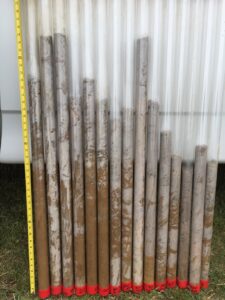2016 Annual Report for GNE16-138
Targeting sustainable soil management practices using crop modeling in soybean systems.
Summary
Soybean (Glycine max L.) production has grown throughout the Northeast US during the past decade propelled by the increasing demand for and price of grains worldwide and the need for a locally produced feed source for the Northeast livestock industry. In order to maintain a sustainable local supply of soybeans, there is a need for crop producers to understand management tactics to improve crop profitability and productivity, especially during times of lower grain prices such as exist today. Soil health and crop productivity are intrinsically linked, and understanding the response of crops to soil health can help agronomists and producers target management practices in the region. In addition, it can help to project long term impacts of certain management practices on soil health, offering an economic rationale for investments in more sustainable soil management practices. The purpose of this project is to evaluate and deploy a crop modeling system – CYCLES – across a set of farms in Pennsylvania with the ultimate goal of deploying a decision support system for producers.
Objectives/Performance Targets
The purpose of this project is to deploy and evaluate our approach of integrating soil health measurements with crop modeling to understand soybean yield variation across a set of farms in Pennsylvania with divergent soil management practices. We will identify the soil health characteristics that are most closely related to soybean yield variation and explore the extent to which the simulation model captures the effect of soil health on yields. The outreach part of our project will create an awareness of the potential of crop modeling in advanced crop management and share with producers and their consultants the potential for sustainable soil management to improve soybean yields and profitability.
Specifically, the objectives are:
– Identify key soil health indicators that relate to soybean yield on commercial farms of PA. (in progress)
– Evaluate and improve if needed the cropping systems model CYCLES at simulating the effects of soil health on soybean yields in the selected fields. (in progress)
– Evaluate the impact of soil management history on soil health indicators and soybean yields. (in progress)
– Create awareness among crop producers and consultants about the importance of soil health for crop yields and the ability to use crop modeling to make more sustainable crop management decisions. (in progress)
Accomplishments/Milestones
The planned activities for the first four months of the project were accomplished as projected. After approving the sampling protocol with educators and growers, plant and soil data were collected in four fields (out of a total of 16 foreseen within the duration of the project), and the samples are being currently processed and analyzed in the laboratory. Next steps will be to finishing analyzing the soil and plant data of these fours fields, and to schedule a meeting to discuss initial results and the necessity or not of methodology refining for 2017. The 2016 soil sampling already exhibited great soil depth variability within fields (picture), and therefore it is expected that soil depth will play an important role in the results. The meetings to approve the 2017 sampling protocol for the next 12 fields are expected to be held within the next two months. 
Impacts and Contributions/Outcomes
Using field and modeling techniques, we will identify soil health attributes that are most closely related to soybean yield to both provide agronomists with indicators to use for field estimates of soybean yield potential and to improve model simulations. The outreach component will use multiple approaches, including newsletter articles, field days, and a workshop, to engage consultants and producers in learning about the research results and the potential for models to inform sustainable soil and crop management.
Collaborators:
Professor of Agronomy
Pennsylvania State University
407 Agricultural Sciences and Industries Building
University Park, PA 16801
Associate Professor of Production Systems and Modeling
Pennsylvania State University
247 Agricultural Sciences and Industries Building
University Park, PA 16801
Professor of Soil Science / Soil Physics
Pennsylvania State University
409 Agricultural Sciences and Industries Building
University Park, PA 16801